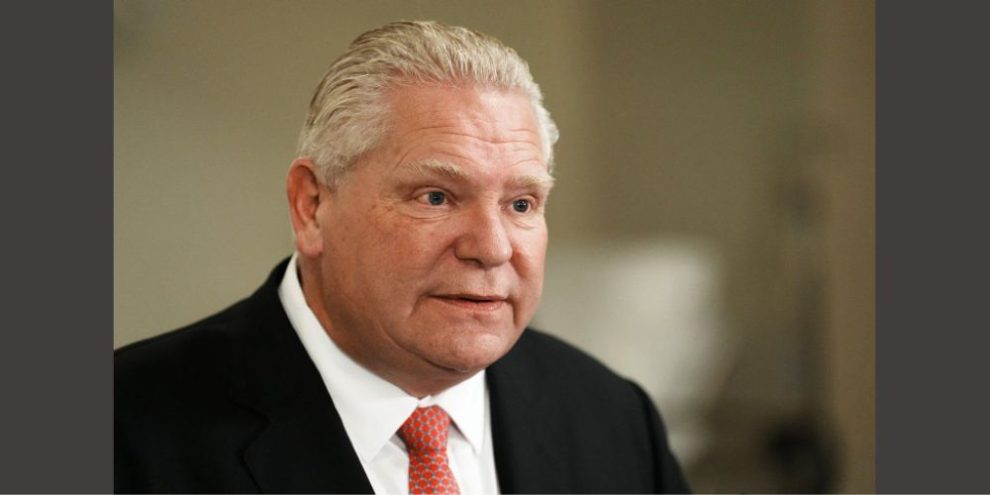
By Allison Jones and Liam Casey in Toronto
Ontario is expanding the private delivery of public health care by funding clinics to perform more cataract surgeries, MRI and CT scans, colonoscopies, hip and knee replacements and other procedures in an attempt to ease pressures on the hospital system.
But critics warn the moves will increase wait times, drain staff from the beleaguered public hospital system and leave patients vulnerable to paying out of pocket.
Making the announcement Monday, Premier Doug Ford lamented "endless debates" about who should deliver health care and said all he cares about is getting people the care they need quickly and safely.
"The way I can describe it, you have a dam, you have a log jam, are you going to just keep pouring the water up against the logs?" Ford said.
"Or are you going to reroute some of the water and take the pressure off the dam? You see what happens when the dam has too much water, it breaks."
Ford and Health Minister Sylvia Jones unveiled a three-step plan Monday to deliver more procedures at private clinics. Both stressed that the surgeries and tests will continue to be paid for by the Ontario Health Insurance Plan.
Catch Your Daily Headlines Here
There are about 206,000 patients waiting for surgical procedures, the province said.
Ford said it's time to start thinking differently about the health system.
"One CEO, and I won't name him, said...'There's only two places in the world that have the health care that we have, the same system, is Cuba and North Korea,'" Ford said.
"Like, really? We need to improve. So we're making the changes with the support of the CEOs and with the associations."
The Ontario Hospital Association said it welcomes the opportunity to work with the province to integrate the new surgical centres into the health-care system.
The Ontario Medical Association said outpatient surgeries in other jurisdictions shows surgeries occur quicker and have lower rates of infection.
The first stage of the plan involves adding 14,000 cataract surgeries through new centres in Windsor, Kitchener-Waterloo and Ottawa. The province said these surgeries will be performed with existing staff and will not take any from the hospital system.
As well, the province is putting $18 million in existing centres across the province for MRI and CT scans, cataract surgeries, other ophthalmic surgeries, certain gynecological surgeries and plastic surgeries. Jones said that will help the wait lists for those procedures return to pre-pandemic levels by March.
Subsequent steps in the plan are set to include expanding the scope and capacity of private surgical and diagnostic centres, including more colonoscopy and endoscopy procedures. The third step will involve issuing more licences, opening more centres and seeing hip and knee replacements performed at those clinics.
Ford said the changes are permanent.
Jones said the companies will have to provide "detailed staffing plans" as part of their applications. A "number of physicians" at the new centres will have to be affiliated with local hospitals, the province said.
The regulatory organization of doctors, The College of Physicians and Surgeons of Ontario, said it told Jones' office that complex procedures such as hip and knee replacement surgeries should remain connected to the hospital system "to ensure continuity of care and patient safety."
"CPSO is supportive of expanding access to diagnostic procedures and less complex surgical procedures in community settings," said Dr. Nancy Whitmore, the registrar of the college, in a statement.
"However, we emphasized our ongoing concern about creating further strain on the present health-care provider crisis particularly in skilled operating room nurses and anesthesiologists."
Five health-care unions called on the province to abandon the plan, saying it will "siphon provincial funding from public hospital care and hand it to private, for-profit surgical clinics."
The Canadian Union of Public Employees, the Ontario Nurses' Association, the Ontario Public Service Employees Union, Service Employees International Union Healthcare and Unifor said province should invest in the public health-care system and implement a staffing retention program.
The head of the Ontario Nurses' Association called the changes a "terrible plan for providing health care" and said it was unconvinced that staffing at hospitals won't be affected.
The current health-care system is 25,000 nurses short, said Bernie Robinson, the interim president of the association.
"I fail to understand where the government thinks it's going to get the human resources to staff these private clinics other than by draining our already-taxed public system," Robinson said.
The Registered Nurses’ Association of Ontario said the province should invest in existing operating rooms across the province that sit quiet on evenings and weekends.
"The premier needs to open the operating rooms, the operating theatres, the recovery rooms in our public hospitals 24/7 like many other countries do," said Doris Grinspun, the association's CEO.
Liberal health critic and MPP Adil Shamji, who worked as an ER doctor prior to last year’s provincial election, said it’s "enticing" for doctors and nurses to work at a 9-5 clinic instead of taking on a mix of overnight and weekend work at hospitals.
Shamji said the Liberals have called for greater investment in private health clinics to ease hospital pressures, but only not-for-profit ones.
When there is a profit motive, there is a danger of patients being pressured to pay out of pocket for tests or treatments above what OHIP covers, he said.
“Physicians, I must emphasize - being one myself - are well intentioned,” Shamji said. "We also want what is best for our patients. But in the setting of corporatized, for-profit practice where there are shareholder and corporate bottom lines that are that are pushing to deliver results, it’s difficult…not to go down that pathway."
Ontario’s auditor general said in a 2021 report that there isn’t enough provincial oversight of such add-on fees. Patients might not be aware of their right to only select what’s funded through OHIP or where they can complain, the auditor wrote.
“This means that the issue of inappropriate and unusual patient charges could be much more widespread than the complaints being made to the Ontario Patient Ombudsman and the ministry,” the report said.
The audit found instances of cataract clinics suggesting the OHIP-covered services are inferior or that purchasing specialty lenses was mandatory.
This report by The Canadian Press was first published Jan. 16, 2023.
Banner image via The Canadian Press






